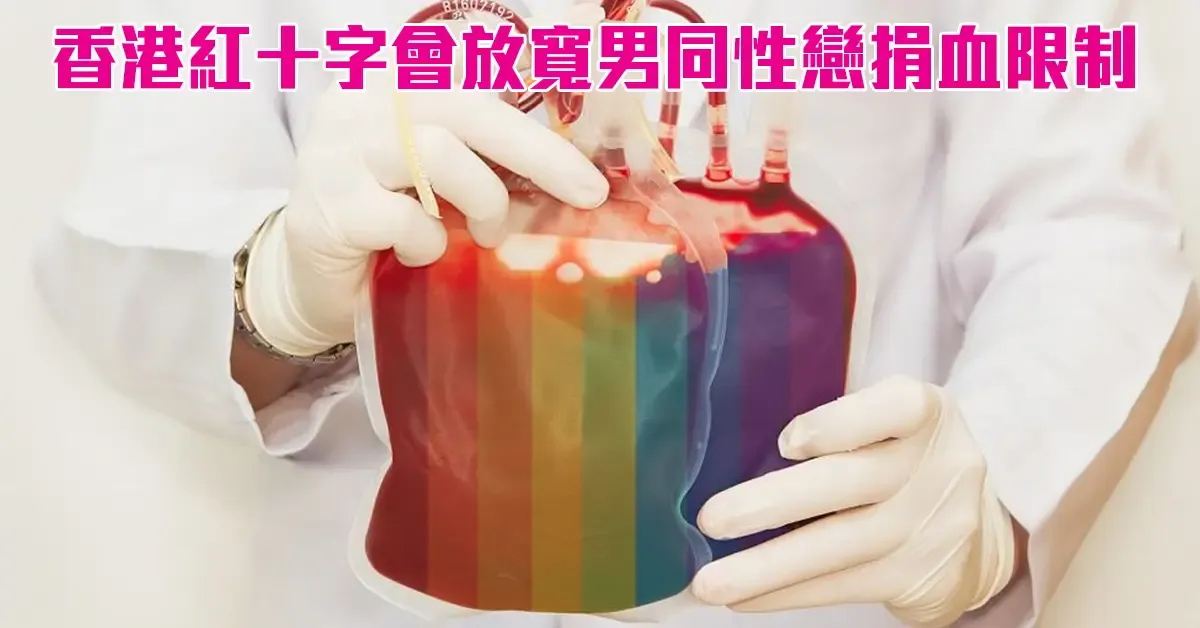Canada revokes blood donation restrictions for niche men, screening based on sexual behavior, non-sexual orientation

Information collation and writing: Jeffrey
Text editor: Wen Lisa
Follow GDotTV Telegram Channel,
Stay up-to-date with the latest news on G-spot TV!
In the 1990s, Health Canada considered all men who have sex with men as a high-risk group and prohibited them from donating blood. Even if the ban was gradually lifted, the current regulations require men to donate blood without having sex with men in the past 3 months. This practice has been criticized as discriminatory. . On April 28 this year, the Ministry of Health announced that it had accepted the proposal of Canadian Blood Services (CBS) to lift the restrictions on gay men, which can be regarded as a small victory for the gender equality movement. From September 30 this year, blood donors, regardless of their sexual orientation, can donate blood if they have not had anal sex with a new sexual partner or with multiple sexual partners in the past 3 months. Many people are encouraged by the lifting of restrictions. Local gay MP Rob Oliphant said that the significance is to show that "my blood is as good as anyone's blood (my blood is as good as anyone's blood)."
The ban stems from the blood infection incident in the 1980s
Canada has banned men who have sex with men from donating blood since 1992. The origin was a scandal in the 1980s. At that time, the Canadian Red Cross did not properly screen blood donors, and the blood testing technology was also backward compared to the current state. As a result, a large number of patients were sent to the hospital. Infected blood, 2,000 people were infected with AIDS virus (HIV), nearly 60,000 people were infected with hepatitis C, and 8,000 people died, and because blood products were also exported, it was as far away as Japan, Germany and Japan. People in the UK have also been infected. However, the testing technology is improving day by day, and the LGBT community and organizations continue to criticize the ban as discriminatory and without scientific basis, so the authorities gradually relax the ban. to 3 months.
On December 3 last year, Isra Levy, vice president of medical affairs at CBS, attended a board meeting and said that the risk of HIV transmission is not determined by sexual orientation, but by sexual behavior. CBS formally proposed to Health Canada to revise the policy, and the Ministry of Health responded that it needs to study whether it is feasible, and finally officially announced the withdrawal of restrictions at the end of April this year.
We promised to end the blood donation ban for men who have sex with men. Our government funded research projects necessary to make this happen. And now, this discriminatory practice will come to an end – @GovCanHealth has authorized Canadian Blood Services to lift the ban .
— Justin Trudeau (@JustinTrudeau) April 29, 2022
On the same day as the announcement, Canadian Prime Minister Justin Trudeau told a news conference that it was good news, but "it took too long." "We should have withdrawn it 10 years ago, 15 years ago," he said. He also pointed out that previous governments had not done research on this, and said, "Our blood supply will be as safe in the future, and there will be discrimination now. The one-size-fits-all ban has been lifted.”
The screening questionnaire is not targeted, and there is a tendency for fixed single-sex partners to donate blood
Currently, heterosexual men in Canada can donate blood even if they have had multiple sexual partners in the past 3 months, but gay men are not allowed to donate blood unless they have had no MSM within the same period. Women were also asked whether their sexual partners in the past three months included men who had sex with men in the past 12 months.
After the new measures were implemented on September 30 this year, the screening questionnaire will not directly ask male blood donors whether they have had sex with another man, but will ask whether they have had a new sexual partner or multiple sexual partners in the past 3 months, Female blood donors will also be asked the same questions. If the blood donor answers "yes", the next step will be to ask whether they have engaged in anal sex. If they answer "yes" in both steps, they will be considered "high-risk". Regardless of gender identity and sexual orientation, they must abstain from such sexual behavior for 3 months before they can donate blood.
"Héma-Québec", which manages blood donation in Quebec, will lift restrictions on gay blood donation in two phases. "Plasma donation will be relaxed first this fall, before expanding to blood and platelet donation in the spring of 2023," a spokesman said.
Many European countries have withdrawn similar restrictions and Taiwan is still completely banned
At present, countries or places that do not require men to postpone blood donation after same-sex sex include the United Kingdom, France, Germany, Italy, Spain, the Netherlands, Indonesia and Russia, etc.; Australia, New Zealand, and the United States have a 3-month abstinence period; Half a year includes Hong Kong, Japan, Sweden; Norway, South Korea, and Switzerland require abstinence for one year, and completely banned include Taiwan, Singapore, Thailand, Malaysia, Egypt, Saudi Arabia, Turkey and Iran. As for women whose sexual partners include men who have sex with men, blood donation restrictions and corresponding abstinence periods in various countries are similar to the above.

Further reading: A small episode in the history of the Red Cross’s blood donation ban|Louis
Hong Kong has been striving to lift restrictions for a long time, but the policy has not kept pace with technological progress
The Hong Kong Red Cross Blood Transfusion Service used to prohibit men who have had sex with men from donating blood across the board in the past, but it was later relaxed to a one-year moratorium, and then changed to six months, which is still in effect today. The movement to lift the restrictions has been going on for a long time. For example, in 2000, Yaba and Atian, members of the "She He Middle School", a comrade group of middle school students, went to the blood donation station to donate blood . During the process, they revealed that they had had sex with men. The staff refused the blood donation of the two. He also said, "You have the same disease as hepatitis B. You cannot donate blood. You are a high-risk group for AIDS." However, there is no restriction on lesbian discrimination.
By 2017, the relevant policy was changed to require men to donate blood without MSM within a year . Chen also said that this was a "very disappointing progress", and believed that the blood donor's safe sex should be targeted, not the blood donor's sexual orientation. . At present, the screening questionnaire in Hong Kong asks male blood donors whether they have had sex with men in the past 6 months, and also asks female blood donors whether they have had intersex sex with men during the same period, according to the Red Cross Blood Transfusion Center. If there are any of the above behaviors, medical staff will conduct individual assessments.
It is reported that blood packs of blood donors in Hong Kong will be tested for HIV "antibody". Since 2007, the Red Cross has adopted new nucleic acid testing technology, and the window period has been shortened to 6 days. With the maturity of testing technology, many countries have shortened or cancelled the so-called abstinence period and allowed more people to donate blood. It can be seen that Hong Kong's policy is still lagging behind.

Further reading: Hong Kong Red Cross relaxes blood donation restrictions for gay men
Original link G-spot TV
Like my work? Don't forget to support and clap, let me know that you are with me on the road of creation. Keep this enthusiasm together!

- Author
- More